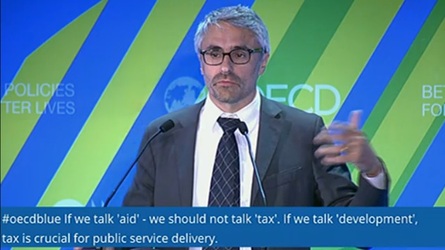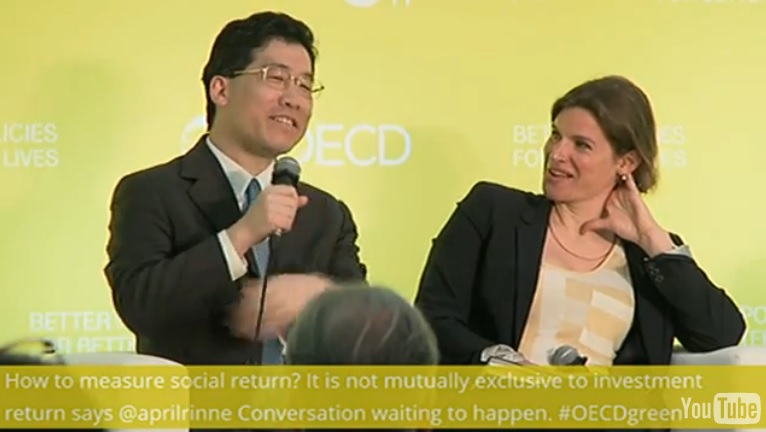 Pascal Saint-Amans, Director of the Centre for Tax Policy and Administration of the OECD addressing the audience (statement in the blue bar contributed by URAIDE during the session) Pascal Saint-Amans, Director of the Centre for Tax Policy and Administration of the OECD addressing the audience (statement in the blue bar contributed by URAIDE during the session) Paris, 5 May, 2014 Today a two day forum commenced, organized by the OECD, an organization committed to improve policies for development. Two sessions were in particular drawing my attention. One discussing tax as an alternative to development aid. The other one focussing on the sharing economy. The first following a twentieth century model of statebuilding, the latter questioning the presupposition of it. How to raise tax Jon Lomoy, the Norwegian Director of the Development Cooperation Directorate of the OECD, pointed to the deliberations at the UN in New York to arrive at a new set of Sustainable Development Goals. In order to achieve those goals three kind of income matter: tarif, tax and transfer. The argument in the blue room today was that tax should replace transfer. Oxfam pointed to a Christian Aid study indicating Sub-Sahara Africa requiring 650.000 tax officials to be employed to build a tax system that levels the ones in OECD countries. Apart from lack of capacity in developing countries, Pascal Saint-Amans of the Centre for Tax Policy and Administration enlightened the audience about Base Erosion and Profit Shifting (BEPS). The Colombian Minister on the panel mentioned the importance of consideration of the informal economy that usually does not show up in national figures. Deployment of tax inspectors without borders is considered from 2017 onwards (after successful completion of ongoing pilots). How to put tax to use In the green room earlier on Prof. Mariana Mazzucato wondered what is happening to tax, even when it is paid. In many countries those taxes may be re-invested in short-term innovation funds expecting a return in three to five years. She pointed to valuable contribution of development banks in both China and Brasil with a much longer time-horizon towards innovation. April Rinne of the Collaborative Lab and special advisor on a committee in Seoul strategizing the shared economy, passionately shared some disqualifyers for ownership and some incentives for a Sharing Economy. A lot of proceeds of this economy do no not end up in GDP statistics. She also sympetized with local administrators who often are not able to accomodate new businesses models in old systems. With tax systems based on the individual ownership model it will be difficult to accomodate the social economy. Sang Woo Kim, president of corporate affairs Europe for Samsung Electronics was amazed with the poor internet speed at household level in a number of European countries, which will be a determining factor in competitiveness in future. Infrastructure remains crucial. It has the potential to bridge cultural differences and develop trust. Challenging the innovation model Prof. Mariana Mazzucato went on to challenge the short-term funding model for innovation that won't create new markets. It takes a long time for revolutions to get fully deployed she argued. We should learn from the past. Sub-urbanization was a result of public policy. She pointed to the relevance of the green revolution for the deployment of the IT revolution. What she was hugely missing in governments was mission oriented thinking, with the tax avoidance industry benefiting of the complexity of current taxation systems. The way some European governments are currently financing innovation leads to socialization of risks and privatisation of rewards. Also the way companies are valued was questioned. Not the sheer volume of operations, but the number of business interactions should matter for a company to be called big. Somehow teaching came in as well though was dealt with in a separate session. It was noticed that patenting practice that are even applied to research tools by developed economies are stifling learning, especially in developing nations. Later during the day experiences with Massive Online Open Courses was shared by Anke Mulder of Delft Univeristy. Learning to organize will become one of the key capabilities also to get innovation going. Cross-sector collaboration will be pivotal requiring professionals with multiple specialisms. Comments are closed.
|
About meMy name is Reinier van Hoffen. U®Reading
Click here for a summary.
Also find the text of a lecture Dr. Achterhuis held at the 2012 Bilderberg conference. Archives
August 2022
|
AddressNachtegaallaan 26
Ede, the Netherlands |
Telephone+31 (0)6 1429 1569
|
|

 RSS Feed
RSS Feed
















